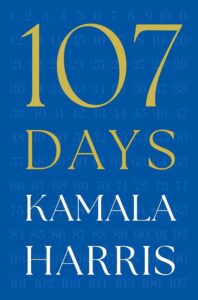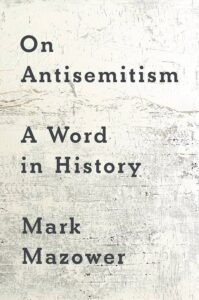
5 Book Reviews You Need to Read This Week
“Although the author is 88 years old, his intellect, at least on the evidence of this book, remains undiminished.”
Our basket of brilliant reviews this week includes Kathryn Schulz on Thomas Pynchon’s Shadow Ticket, Ron Charles on Lily King’s Heart the Lover, Arwa Mahdawi on Kamala Harris’ 107 Days, Lily Meyer on Mark Mazower’s On Antisemitism, and K. Twaddle on Mindy Mejia’s The Whisper Place.
Brought to you by Book Marks, Lit Hub’s home for book reviews.
*
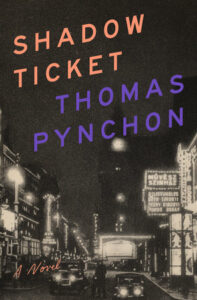
“America, circa now. Things, most of which have been weird for a while, are getting distinctly weirder. The President of the United States is busy redecorating the White House and bent on buying Greenland. A new wonder drug is making people skinny. Domestic affairs are increasingly controlled by an upstart political entity whose official status is murky but whose powers are all but limitless: doge, or the Department of Government Efficiency, which was started by a multibillionaire with a sideline in unusual forms of transportation—rocket ships, Cybertrucks, Hyperloops—and named for an internet meme featuring the Comic Sans typeface and a Shiba Inu. Tens of millions of people, followers of a mysterious figure known only by the letter ‘Q,’ believe that many of the nation’s leaders are involved in a global child-sex-trafficking ring that will one day be crushed in an all-encompassing, all-cleansing event called The Event.
Talking dogs, strange vehicles, conspiracy theories, stupid acronyms: life imitates cult fiction, apparently, and somewhere along the line our reality started to resemble, with uncanny specificity, the collected works of Thomas Pynchon. This is not a welcome development, as even his greatest fans would affirm.
…
“Yet here we are—and here comes Shadow Ticket, the first new work by Pynchon in a dozen years. Although the author is eighty-eight years old, his intellect, at least on the evidence of this book, remains undiminished, which is to say, it is still panoptic, exciting, abstruse, distractible, and, for good or ill, unrestrained. But, if his powers are not dulled, neither are they pointed; even if you squint, it’s difficult to determine whether Shadow Ticket is a commentary on our current era—or, anyway, more of a commentary than, say, Gravity’s Rainbow, which was published half a century ago.
This will disappoint any fans who were hoping for a rousing Pynchon riposte to our depressingly Pynchonesque era, but it’s hardly a problem. Literature has no obligation to be responsive to the times; indeed, at its best it often isn’t, which is why ‘timeless’ is such lofty, if hackneyed, praise. But it does raise a question. If our reigning artist of paranoid convictions, of high crimes and deep states, of the peculiar combination of depravity and absurdity found in those who lust for power—if that guy hasn’t made use of the present political moment to craft a satire or a survival manual or a swan song or even an ‘I told you so,’ then what has he come here, after a long silence and in all likelihood for the last time, to tell us?”
–Kathryn Schulz on Thomas Pynchon’s Shadow Ticket (The New Yorker)
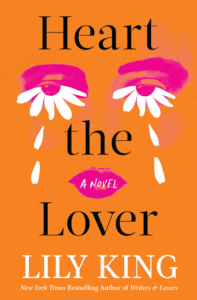
“Even I, who married my college sweetheart more than 40 happy years ago, read Lily King’s new novel about what might have been in a state of blubbery longing. For those of us of a certain age, Heart the Lover is nostalgia distilled to black ink. Like a lonely English major, the book stands entirely on its own. But if you know King’s work, you’ll appreciate how this new story wraps around her previous novel, exploring a young woman’s life before and after Writers & Lovers.
…
“You may have once dated these cerebral jerks. You may have once been these cerebral jerks. But the novel doesn’t work if we can’t appreciate Sam and Yash as Jordan does. For all their obnoxious intellectuality, in King’s tender portrayal, they’re genuinely funny and sweet, more posing than imposing. The inside jokes, the pseudo-profound bull sessions, the giddy thrill of undergraduate trysts—they’re all caught here in prose tuned to those few magical years when we felt everything so deeply we could barely stand it.
…
“This novel that begins with the high-pitched melody of college life eventually drops into the most somber chords of life and death. Even before we can brace ourselves, we’re swept into the throes of two lives focused by impossibly cruel circumstances on what really matters to them, those essential truths they never confronted back in the halcyon days of rash devotions and hurt feelings. Like the rest of us, Jordan learns too late that the ‘decisions we make in youth are everything.’ Only Lily King could tell a story so steeped in sorrow and so filled with hope.”
–Ron Charles on Lily King’s Heart the Lover (The Washington Post)
“lmost a year after the 2024 election there are still some houses with ‘Harris’ signs in their windows dotted around my liberal Philadelphia neighbourhood. The result left many people in a state of shock and denial, unable to process exactly what went wrong.
…
I don’t know if Harris found writing 107 Days cathartic, but reading it certainly wasn’t. Instead, the book, which unfolds in strictly chronological order, is a frustrating slog. It seems likely to alienate her critics further and provides no closure or hope for her supporters. Harris has always been accused of sounding phoney; criticism she brushes off in the book as sexism. When Charlamagne Tha God, host of popular radio show The Breakfast Club, observed that she came off as ‘very scripted’ on the campaign trail, she retorted that it was actually ‘discipline.’ The memoir was Harris’s opportunity to go off-script. Instead she sticks to her talking points.
…
“Her own book, however, makes it clear she still has blind spots about what went wrong. While a January YouGov pollsuggests Biden’s unconditional support for Israel significantly affected Democratic voter turnout, Harris is largely dismissive of Gaza. Of demonstrators who turned up at campaign stops she asks: ‘Why weren’t they protesting at Trump rallies?’ Can she really not understand? Because Trump was not in power at the time, and she was. Because President Biden made it clear he had no real empathy for Palestinians. Harris doesn’t seem to have much, either.
It’s not just those upset about Gaza who will bristle at this account. The former vice-president’s characterizations of peers such as Pete Buttigieg (talented but too gay for the America to accept as her running mate), and Josh Shapiro (an egoist) are not particularly juicy, but have already caused bad blood. As for any Harris supporters hoping 107 Daysmight bring closure or optimism, they will also be sorely disappointed. It may be time for the holdouts to finally take those Harris signs down, because the woman who kept telling voters ‘we’re not going back’ fails to chart any kind of path forward for the United States. In the end, she seems just as helpless as the rest of us.”
–Arwa Mahdawi on Kamala Harris’ 107 Days (The Guardian)
“Clearly, it is incoherent to lump wholesale racial hatred in with a targeted protest technique, and incoherence of this sort is exactly what intellectual history—the genre to which On Antisemitism belongs—is built to address. If most history chases what happened, intellectual history chases the ideas that made it happen; if the former helps explain why we live how we live, the latter addresses why we think what we think and feel what we feel. At a moment when many people’s thoughts and feelings about antisemitism are intense without necessarily being intelligible to others, and when accusations of antisemitism are tremendously forceful, Mazower’s book makes an immense contribution. In tracing the evolving meaning of ‘antisemitism,’ he demonstrates persuasively how we might turn it from a weapon back into a word.
It helps that Mazower, as a scholar of nationalism, is used to negotiating the risk that his research and arguments may turn into what the legendary English historian Eric Hobsbawm called ‘a politically or ideologically explosive intervention’ in the present. From the beginning, he’s clear that On Antisemitism, though it isn’t strictly about nationalism, will deal at length with Israeli nationalist—that is, Zionist—ideology. It has to. The intellectual arc Mazower traces is the transformation of antisemitism’s meaning from persecution of Jews on ethnic or religious grounds to any criticism of anything Jews do, even if the Jews in question are the government and defense forces of the state of Israel. That transformation is intertwined with the historical evolution of Zionism, and Mazower does not think that it’s good for the Jews.
…
“Almost since antisemitism appeared as a political concept, Zionists have used it to argue that Jews can only flourish in a Jewish state. Once established, that state has invoked antisemitism not only to make the same claim, but also to shut down opposition and, at times, diplomacy. It has repeatedly manipulated Holocaust remembrance to serve its cause and to diminish the validity of Palestine’s. On this front, Israel is not alone. Germany is paranoically supportive of Israel as a result of Holocaust-memory rhetoric. The United States, Mazower writes, treats the Holocaust as ‘a guarantee of America’s commitment to Israel.’ And the most commonly used definition of antisemitism today, one that many nations have adopted and that Mazower objects to strenuously, was generated by the intergovernmental International Holocaust Remembrance Alliance in 2016.
…
“On Antisemitism is the precise opposite of the IHRA definition. It is rigorous and lucid, and, like any good work of history, it absolutely bristles with primary sources. Even when Mazower’s writing is explicitly opinionated, he always shows the reader precisely what documents or events he’s basing his opinion on. In a book that deals so intensely with the manipulation of ideas and emotions, this transparency is an intense relief. Mazower knocks away decades of obfuscation of what antisemitism actually is to demonstrate, at the very least, what it is not: a unique prejudice, unchanging no matter its context, that affects all Jews equally while rendering the state of Israel above international law and immune to critique or protest. Perhaps that idea, elementary though it may seem, is where a good-faith conversation can start.”
–Lily Meyer on Mark Mazower’s On Antisemitism: A Word in History (The New Republic)
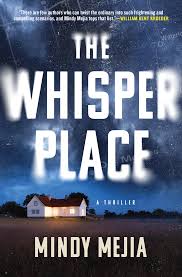
“Mejia catches her stride with The Whisper Place, constructing a compelling thriller rooted in love and fear between people who care about each other. The scope of this novel is much smaller than the previous two in the series, but that tightened focus allows the book to flourish. Mejia takes time to explore human moments between the characters, from early mornings spent bellowing along to a playlist, to a double-date night. These gentler scenes underscore the humanity of the three main characters while serving as a sharp contrast to the horrors they face. The reader has a greater emotional investment in Max and Jonah, watching them navigate their friendship while also relying on each other professionally. Darcy’s past and current traumas become more visceral when held up to her joys.
Iowa City is represented so cleanly that it’s clear Mejia either spent time in the City of Literature or is very Google Maps adept. She describes Iowa City with exacting detail while being intentionally vague in her descriptions of other locations, underscoring how characters perceive time and space differently and to different ends. Max and Jonah view the city through the lens of their investigation, and Darcy experiences it as a place of joy. When the novel shifts to Illinois, details become blurrier, reflecting the impact trauma can have on the brain while also mirroring the lack of clarity within the investigation.
“Mejia’s thriller is a love letter to the Midwest, as strange as that may seem given the graphic nature of the novel. The Midwest can be calm and chaotic, physical and supernatural; the repeated references to the wide-open spaces of Iowa are always framed in the positive, meant to highlight the strange beauty of nothing. Openness does not equate to absence in Mejia’s text. Rather, openness is meant to make room for everything humanity has to offer—the good and the bad thrown in stark relief.”
–K. Twaddle on Mindy Mejia’s The Whisper Place (Little Village Magazine)
Book Marks
Visit Book Marks, Lit Hub's home for book reviews, at https://bookmarks.reviews/ or on social media at @bookmarksreads.










